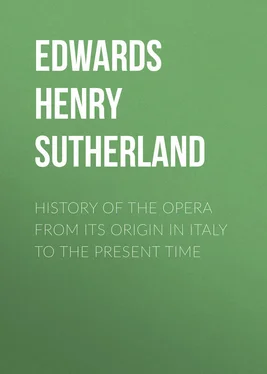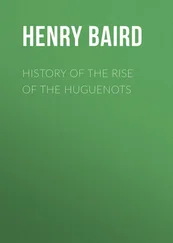Henry Edwards - History of the Opera from its Origin in Italy to the present Time
Здесь есть возможность читать онлайн «Henry Edwards - History of the Opera from its Origin in Italy to the present Time» — ознакомительный отрывок электронной книги совершенно бесплатно, а после прочтения отрывка купить полную версию. В некоторых случаях можно слушать аудио, скачать через торрент в формате fb2 и присутствует краткое содержание. Жанр: foreign_home, music_dancing, foreign_antique, foreign_prose, на английском языке. Описание произведения, (предисловие) а так же отзывы посетителей доступны на портале библиотеки ЛибКат.
- Название:History of the Opera from its Origin in Italy to the present Time
- Автор:
- Жанр:
- Год:неизвестен
- ISBN:нет данных
- Рейтинг книги:4 / 5. Голосов: 1
-
Избранное:Добавить в избранное
- Отзывы:
-
Ваша оценка:
- 80
- 1
- 2
- 3
- 4
- 5
History of the Opera from its Origin in Italy to the present Time: краткое содержание, описание и аннотация
Предлагаем к чтению аннотацию, описание, краткое содержание или предисловие (зависит от того, что написал сам автор книги «History of the Opera from its Origin in Italy to the present Time»). Если вы не нашли необходимую информацию о книге — напишите в комментариях, мы постараемся отыскать её.
History of the Opera from its Origin in Italy to the present Time — читать онлайн ознакомительный отрывок
Ниже представлен текст книги, разбитый по страницам. Система сохранения места последней прочитанной страницы, позволяет с удобством читать онлайн бесплатно книгу «History of the Opera from its Origin in Italy to the present Time», без необходимости каждый раз заново искать на чём Вы остановились. Поставьте закладку, и сможете в любой момент перейти на страницу, на которой закончили чтение.
Интервал:
Закладка:
But about this Christian Soldier who endeavours to convince his readers that music is a thing to be despised because it does not appeal to the understanding, and who laughs at the misfortunes of a poor lunatic because she is no longer able to attract the public by her singing from the dramatic theatre in which he took so deep an interest, and of which he afterwards became patentee? 15 15 The same trenchant critics who attribute Addison's satire of the Opera to the failure of his Rosamond , explain Steele's attacks by his position as patentee of Drury Lane Theatre. Here, however, dates come to our assistance. The jocose paper on Mrs. Toft's insanity appeared in the Tatler , in 1709. The attacks of the unhappy Clayton on Handel (see following pages) were published under Steele's auspices in the Spectator , in 1711-12. Steele did not succeed Collier as manager or patentee of Drury Lane, together with Wilks, Doggett, and Cibber, until 1714.
Of course, if music appealed only to the understanding, mad Saul would have found no solace in the tones of David's harp, and it would be hideously irreverent to imagine the angels of heaven singing hymns to their Creator. Steele, of course, knew this, and also that the pleasure given by music is not a mere physical sensation, to be enjoyed as an Angora cat enjoys the smell of flowers, but he seems to have thought it was his duty (as it afterwards became his interest) to write up the drama and write down the Opera at all hazards. Powerful penmanship it must have been, however, that would have put down Handel, or that would have kept up Mr. Ambrose Phillips. It would have been easier, at least it would have been more successful, to have gone upon the other tack. We all know Handel, and (if the expression be permitted) he becomes more immortal every day. Steele, it is true, did not hold his music in any esteem, but Mozart, a competent judge in such matters, did , and reckoned it an honour to write additional accompaniments to the elder master's greatest work. And who was this Ambrose Phillips? some reader, not necessarily ignorant of his country's literature, may ask. He was Racine's thief. He stole Andromaque , and gave it to the English as his own, calling it prosaically and stupidly "The Distrest Mother," which is as if we should call "Abel" "The Uncivil Brother," or "Philoctetes" "The Man with the Bad Foot," or "Prometheus," "The Gentleman with the Liver Complaint." Steele wrote a paper 16 16 Spectator , 290.
on the reading of this new tragedy, in which he declares that "the style of the play is such as becomes those of the first education, and the sentiments worthy of those of the highest figure." He also says, "I congratulate the age that they are at last to see truth and human life represented in the incidents which concern heroes and heroines."
Translated Racine was very popular just then with writers who regarded Shakespeare as a dealer in the false sublime. "Would one think it was possible," asks Addison, "at a time when an author lived that was able to write the Phedra and Hippolytus (translate Phèdre , that is to say), for a people to be so stupidly fond of the Italian Opera as scarce to give a third day's hearing to that admirable tragedy."
Sensible people! It seems quite possible to us in the present day that they should have preferred Handel's music to Racine's rhymed prose, rendered into English rhymes by a man who had nothing of the poetical spirit which Racine, though writing in an unpoetical language, certainly possessed.
The triumphant success of Handel's Rinaldo was felt deeply by Steele and by the Spectator's favourite composer Clayton, a bad musician, and apart from the practice of his art, as base a scoundrel as ever libelled a great man. But of course critics who besides expatiating on the blemishes of Shakespeare dwelt on the beauties of Racine as improved by Phillips, would be sure to enjoy the cacophony of Clayton;
"Qui Bavium non odit amet tua carmina Mævi."
However we must leave the chivalrous Steele and his faithful minstrel for the present. We have done with the writer's triumphant gloating over the insanity of the poor prima donna . We shall presently see the musician publishing impudent falsehoods, under the auspices of his literary patron, concerning Handel and his genius, and endeavouring, always with the same protection, to form a cabal for the avowed purpose of driving him from the country which he was so greatly benefiting.
Before Handel's arrival in England Steele had not only insulted operatic singers, but in recording the success of Scarlatti's Pyrrhus and Demetrius , had openly proclaimed his chagrin thereat. "This intelligence," he says, "is not very agreeable to our friends of the theatre."
Pyrrhus and Demetrius , in which the celebrated Nicolini made his first appearance, was the last opera performed partly in English and partly in Italian.
In 1710, Almahide , of which the music is attributed to Buononcini, was played entirely in the Italian language, with Valentine, Nicolini, Margarita de l'Epine, Cassani, and "Signora Isabella" (Isabella Girardean), in the principal parts. The same year Hydaspes was produced. This marvellous work, which is not likely to be forgotten by readers of the Spectator , was brought out under the direction of Nicolini, the sopranist, who performed the part of the hero. The other singers were those included in the cast of Almahide , with the addition of Lawrence, an English tenor, who was in the habit of singing in Italian operas, and of whom it was humourously said by Addison, in his proposition for an opera in Greek, that he "could learn to speak the language as well as he does Italian in a fortnight's time." "Hydaspes" is a sort of profane Daniel, who being thrown into an amphitheatre to be devoured by a lion, is saved not by faith, but by love; the presence of his mistress among the spectators inspiring him with such courage, that after appealing to the monster in a minor key, and telling him that he may tear his bosom but cannot touch his heart, he attacks him in the relative major, and strangles him.
"There is nothing of late years," says Addison, in one of the most amusing of his papers on the Opera, "that has afforded matter of greater amusement to the town than Signior Nicolini's combat with a lion in the Haymarket, which has been very often exhibited to the general satisfaction of most of the nobility and gentry in the kingdom of Great Britain." Upon the first rumour of this intended combat, it was confidently affirmed, and is still believed by many in both galleries, that there would be a tame lion sent from the tower every Opera night, in order to be killed by Hydaspes; this report, though altogether so universally prevalent in the upper regions of the play-house, that some of the most refined politicians in those parts of the audience gave it out in whisper, that the lion was a cousin-german of the tiger who made his appearance in King William's days, and that the stage would be supplied with lions at the public expense, during the whole session. Many likewise were the conjectures of the treatment which this lion was to meet with from the hands of Signior Nicolini; some supposed that he was to subdue him in recitative, as Orpheus used to serve the wild beasts in his time, and afterwards to knock him on the head; some fancied that the lion would not pretend to lay his paws upon the hero, by reason of the received opinion, that a lion will not hurt a virgin. Several who pretended to have seen the Opera in Italy, had informed their friends, that the lion was to act a part in high Dutch, and roar twice or thrice to a thorough bass, before he fell at the feet of Hydaspes. To clear up a matter that was so variously reported, I have made it my business to examine whether this pretended lion is really the savage he appears to be, or only a counterfeit.
Читать дальшеИнтервал:
Закладка:
Похожие книги на «History of the Opera from its Origin in Italy to the present Time»
Представляем Вашему вниманию похожие книги на «History of the Opera from its Origin in Italy to the present Time» списком для выбора. Мы отобрали схожую по названию и смыслу литературу в надежде предоставить читателям больше вариантов отыскать новые, интересные, ещё непрочитанные произведения.
Обсуждение, отзывы о книге «History of the Opera from its Origin in Italy to the present Time» и просто собственные мнения читателей. Оставьте ваши комментарии, напишите, что Вы думаете о произведении, его смысле или главных героях. Укажите что конкретно понравилось, а что нет, и почему Вы так считаете.












